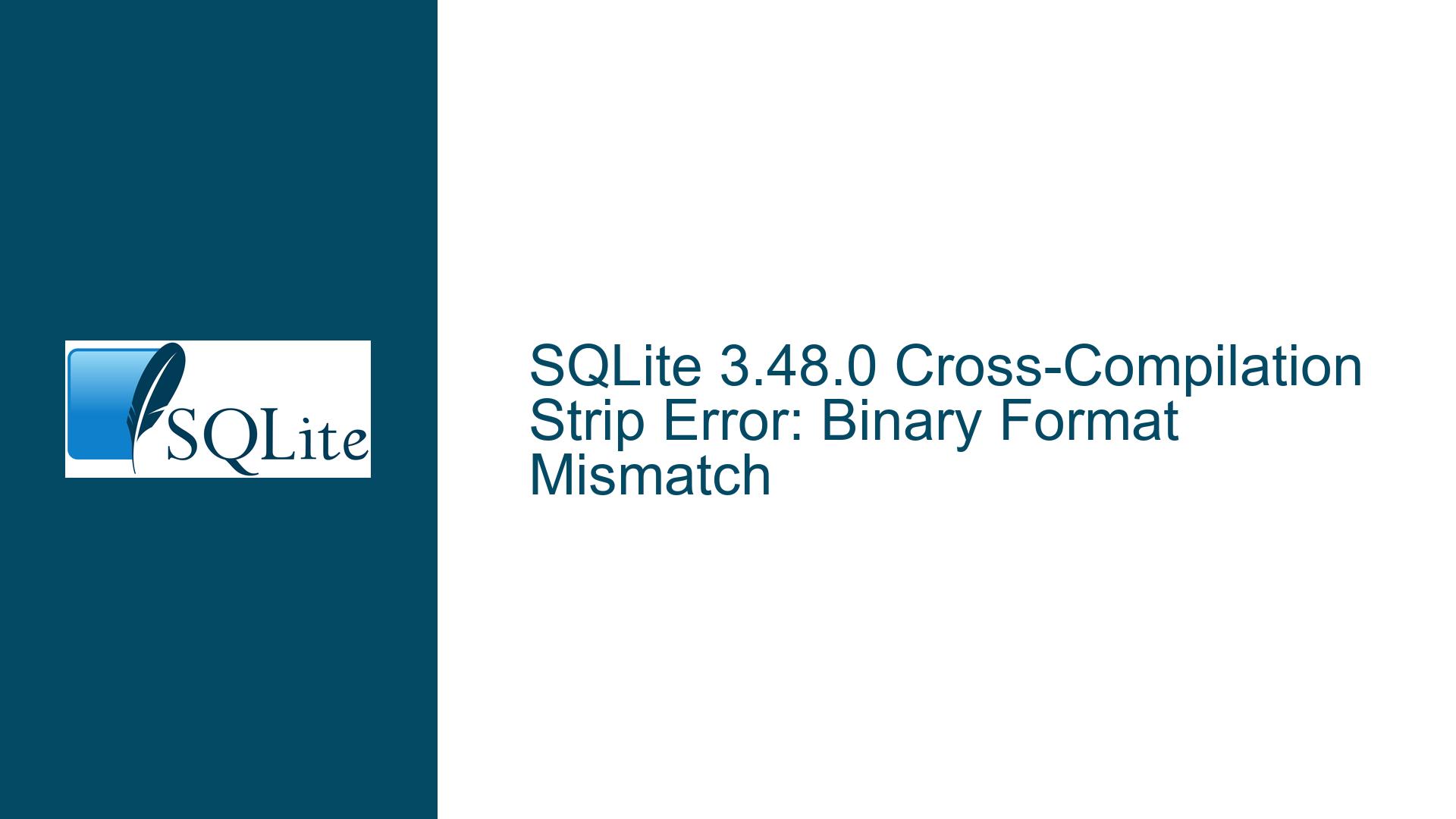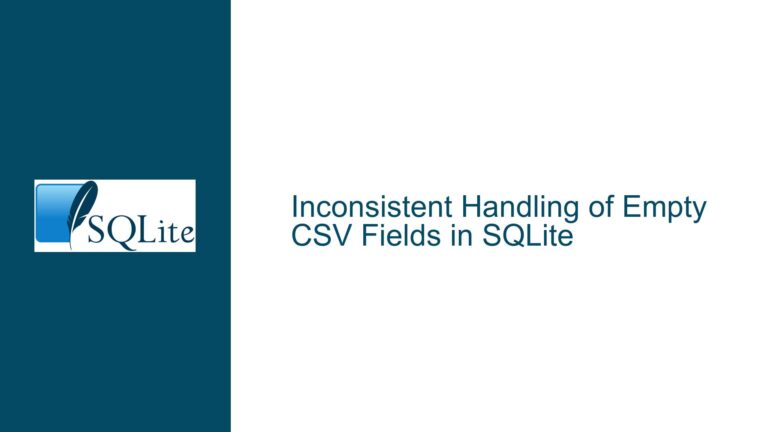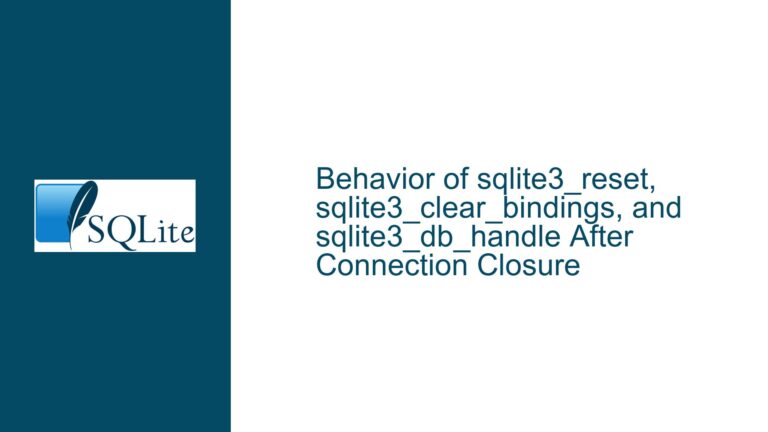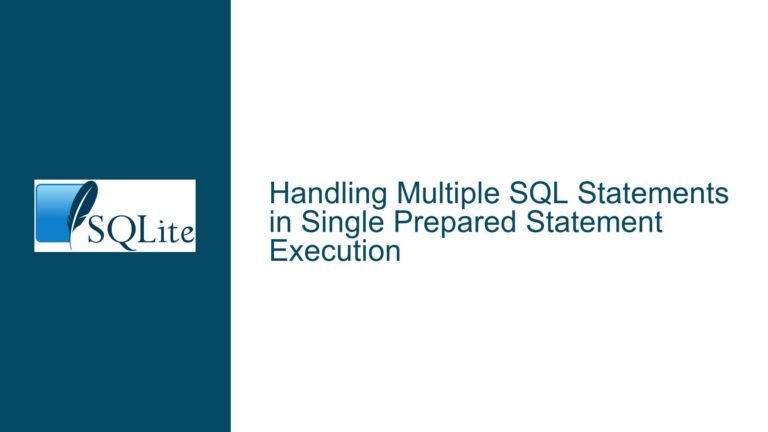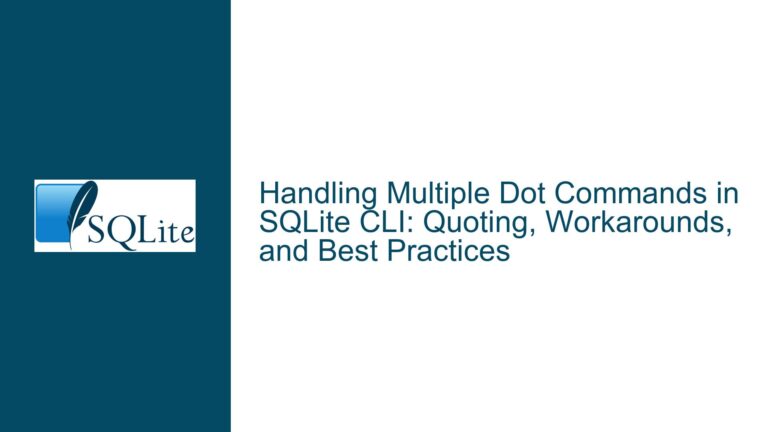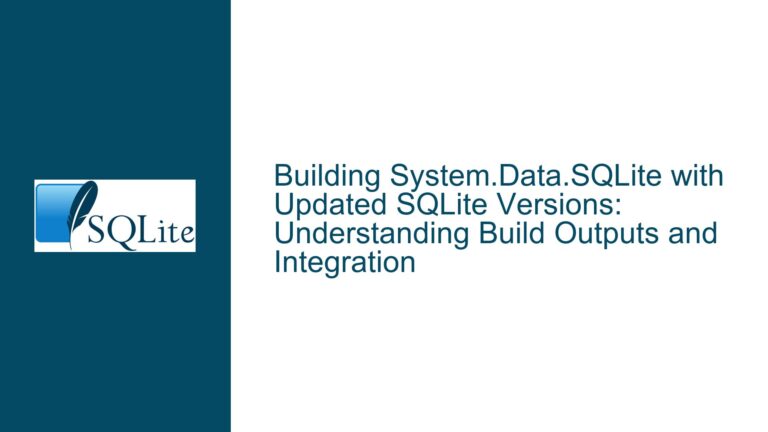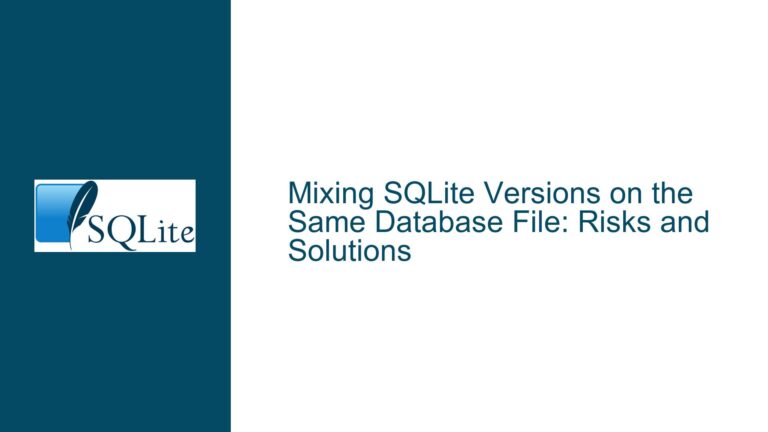SQLite 3.48.0 Cross-Compilation Strip Error: Binary Format Mismatch
Cross-Platform Binary Installation Failure in SQLite Build System Migration
The SQLite project’s transition to version 3.48.0 introduced a critical build system modification that affects cross-compilation scenarios, particularly when targeting non-native architectures. The core issue manifests during the installation phase of the SQLite CLI binary, where the build process attempts to strip debug symbols from the compiled binary using the host system’s strip utility.
The specific error occurs when building SQLite 3.48.0 for the aarch64-unknown-linux-musl target architecture on a different host platform. The build process fails with the error message "strip: Unable to recognise the format of the input file /cross_root/aarch64-unknown-linux-musl/bin/sqlite3" during the installation step. This error stems from the incompatibility between the host system’s strip utility and the target architecture’s binary format.
The root cause of this regression lies in the fundamental changes to SQLite’s build system in version 3.48.0. Prior versions utilized the GNU Libtool system for managing binary and library installations, which handled cross-compilation scenarios more gracefully. The new build system implements a more conventional approach using install -s for binary installation, which attempts to strip debug symbols using the host system’s strip utility.
This architectural change has significant implications for binary size management. When successfully stripped on compatible systems, the SQLite CLI binary experiences a dramatic size reduction – from approximately 7.4MB to 1.6MB, representing a 4.5x decrease in file size. However, this optimization becomes problematic in cross-compilation environments where the host and target architectures differ.
The issue particularly impacts developers and build systems that:
- Utilize musl-cross or similar cross-compilation toolchains
- Target ARM-based architectures from x86/x64 build hosts
- Require automated builds for multiple target architectures
- Need to maintain consistent build processes across different SQLite versions
The regression is particularly noticeable when comparing build logs between versions 3.47.2 and 3.48.0, where the former version’s build process successfully completes without attempting to strip the cross-compiled binary. This change in behavior represents a significant shift in how SQLite handles binary installation and optimization during the build process.
Root Causes Behind Cross-Compilation Strip Failures
The strip utility’s incompatibility with cross-compiled binaries stems from several fundamental architectural constraints and implementation decisions:
Platform Binary Format Mismatch
The host system’s strip utility can only process binary files compiled for its native architecture. When cross-compiling SQLite for architectures like aarch64 or ARM from an x86_64 host, the strip utility fails to recognize the foreign binary format. This limitation is inherent to the binary utilities toolchain, as each architecture has its own specific executable format and ABI requirements.
Build System Evolution Impact
The transition from libtool to a more conventional build system in SQLite 3.48.0 introduced new challenges in cross-compilation scenarios. While the previous libtool-based system handled cross-compilation gracefully by avoiding unnecessary stripping operations, the new system’s default behavior attempts to strip binaries using the host system’s tools.
Binary Size and Optimization Implications
The stripping process significantly impacts binary size optimization:
| State | Size | Relative Size |
|---|---|---|
| Unstripped | 7.4MB | 4.5x |
| Stripped | 1.6MB | 1x |
This size reduction becomes problematic in cross-compilation environments where the stripping operation cannot be performed by the host system.
Toolchain Configuration Complexities
Cross-compilation environments require precise toolchain configuration. The build process must correctly identify and utilize:
- Target-specific compilers (e.g., aarch64-unknown-linux-musl-cc)
- Architecture-specific binary utilities
- Appropriate library paths and include directories
When these components are misaligned or improperly configured, the build process can fail at various stages, including the final binary installation and optimization steps.
Platform-Specific Dependencies
Cross-compilation challenges extend beyond the basic toolchain setup. Platform-specific headers and libraries must be available and properly referenced. For instance, when targeting Apple platforms, the build system must account for platform-specific headers like TargetConditionals.h. Similar considerations apply to other target platforms and their unique requirements.
Cross-Compilation Binary Stripping Solutions and Best Practices
Immediate Workarounds
Remove the -s flag from $(INSTALL) -s in the main.mk file for SQLite 3.48.0 to allow successful cross-compilation. This modification enables the build process to complete without attempting to strip the binary with incompatible tools.
Build System Configuration
Cross-Compilation Environment Setup
Configure the build environment with appropriate toolchain specifications:
./configure --host=arm-linux \
CC=/opt/cross/bin/arm-linux-gnueabi-gcc \
AR=/opt/cross/bin/arm-linux-gnueabi-ar \
STRIP=/opt/cross/bin/arm-linux-gnueabi-strip \
RANLIB=/opt/cross/bin/arm-linux-gnueabi-ranlib \
CFLAGS="-Os"
Binary Stripping Approaches
| Approach | Method | Compatibility |
|---|---|---|
| Post-Build Strip | Use target architecture strip utility | High |
| Build-time Strip | Disable stripping during build | Universal |
| Manual Strip | Custom script with architecture detection | Flexible |
Advanced Solutions
Automated Build Systems
Implement a comprehensive build system using tools like Buildroot or OpenEmbedded to handle cross-compilation complexities automatically. These systems manage toolchain selection and binary optimization processes transparently.
Custom Strip Script Implementation
#!/bin/bash
TARGET_ARCH=$1
BINARY_PATH=$2
if [ "$TARGET_ARCH" = "aarch64" ]; then
aarch64-linux-gnu-strip $BINARY_PATH
elif [ "$TARGET_ARCH" = "arm" ]; then
arm-linux-gnueabi-strip $BINARY_PATH
fi
Build System Integration
For systems using CMake or similar build tools, implement conditional stripping:
if(CMAKE_BUILD_TYPE STREQUAL "Release")
add_custom_command(TARGET ${TARGET_NAME} POST_BUILD
COMMAND ${CMAKE_STRIP} $<TARGET_FILE:${TARGET_NAME}>)
Optimization Considerations
Binary Size Management
The stripping process significantly impacts binary size, with unstripped binaries typically 4.5x larger than their stripped counterparts. Consider implementing a two-stage approach:
- Build with debug symbols for development
- Strip binaries during the deployment phase using target-specific tools
Platform-Specific Configurations
For embedded systems and specialized platforms, configure the build system to handle architecture-specific requirements:
CFLAGS="-march=armv7ve -mtune=cortex-a7 -Os"
LDFLAGS="--as-needed -fuse-ld=gold"
These optimizations ensure proper binary compatibility while maintaining optimal performance characteristics for the target platform.
